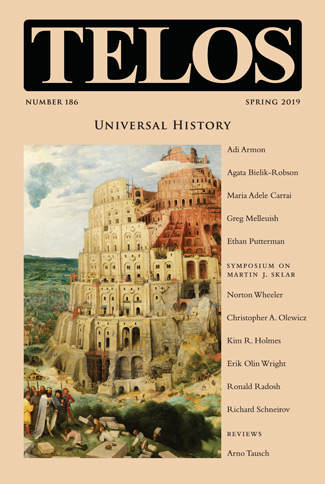Agata Bielik-Robson’s “Marrano Universalism: Benjamin, Derrida, and Buck-Morss on the Condition of Universal Exile” appears in Telos 186 (Spring 2019). Read the full article at the Telos Online website, or purchase a print copy of the issue in our online store. Individual subscriptions to Telos are available in both print and online formats.
 In this article, I would like to outline a new strategy for the universalization of history, which emerges from an analysis of the modern Jewish practice of philosophizing. I call it a Marrano strategy, building an analogy between the religious practices of the late-medieval Sephardic Jewry, which was forced to convert to Christianity but kept Judaism “undercover,” and the philosophical intervention of modern Jewish thinkers who spoke the seemingly universal idiom of Western philosophy but, at the same time, impregnated it “secretly” with the motives deriving from their “particular” background. This secret particularist lining did not serve to abolish the universalist perspective, but merely to transform it; for the last heirs of this “Marrano” line, Walter Benjamin and Jacques Derrida, the proper universalism amounts to an after-Babel project of mending the broken whole from within, horizontally, without assuming the abstract position of a general meta-language, but through the multilingual “task of translation.”
In this article, I would like to outline a new strategy for the universalization of history, which emerges from an analysis of the modern Jewish practice of philosophizing. I call it a Marrano strategy, building an analogy between the religious practices of the late-medieval Sephardic Jewry, which was forced to convert to Christianity but kept Judaism “undercover,” and the philosophical intervention of modern Jewish thinkers who spoke the seemingly universal idiom of Western philosophy but, at the same time, impregnated it “secretly” with the motives deriving from their “particular” background. This secret particularist lining did not serve to abolish the universalist perspective, but merely to transform it; for the last heirs of this “Marrano” line, Walter Benjamin and Jacques Derrida, the proper universalism amounts to an after-Babel project of mending the broken whole from within, horizontally, without assuming the abstract position of a general meta-language, but through the multilingual “task of translation.”







